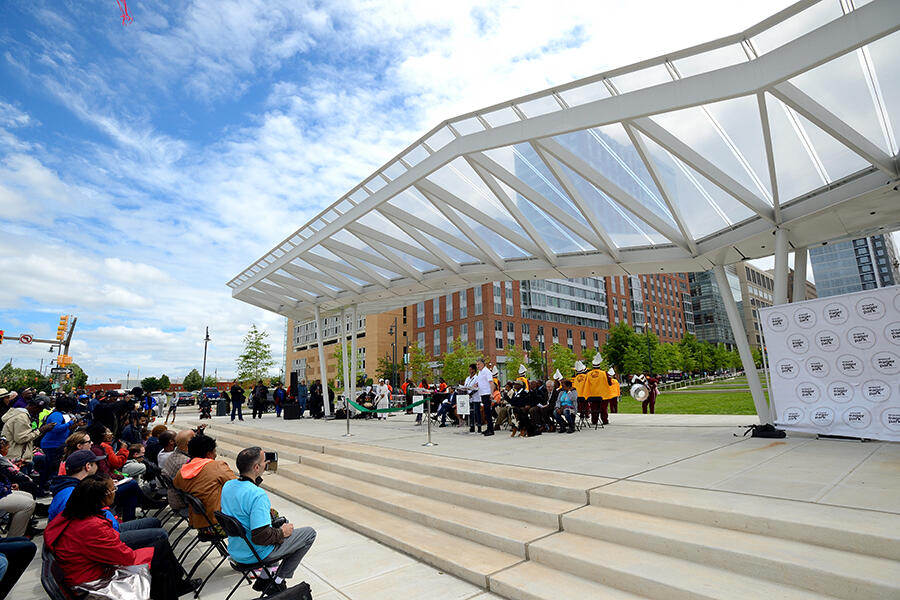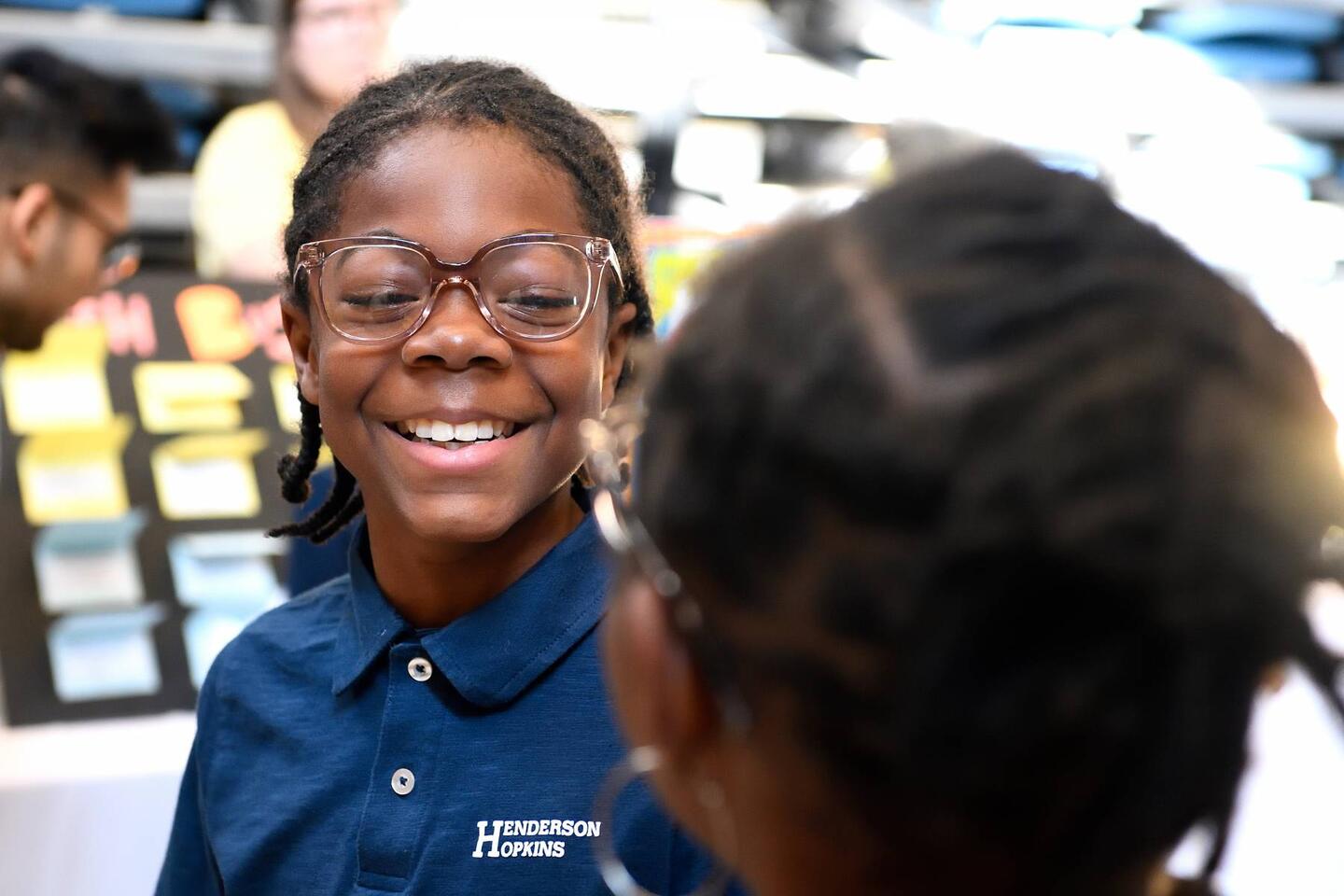- Name
- Johns Hopkins Media Relations
- jhunews@jhu.edu
- Office phone
- 443-997-9009
Johns Hopkins University will launch a new effort to deepen the impact of its engagement, investments, and partnerships across Baltimore, leveraging data-driven insights to help develop, guide, and support people-focused and growth-oriented programs and opportunities.
This initiative will be led by Beth Blauer, who has devoted her career to improving people's lives by bringing data to the decision-making processes of local, state, and national governments, including as associate vice provost for public sector innovation at Johns Hopkins, where she has served as the founder and executive director of the Bloomberg Center for Government Excellence (GovEx) and helped lead the university's efforts to provide reliable data to the public during the COVID-19 pandemic. Blauer is a dedicated public servant who first joined JHU in 2015.

Image caption: Beth Blauer
Blauer's new role as the university's inaugural vice president for public impact initiatives blends her experience as a driver of evidence-based solutions with her steadfast belief in the promise and potential of Baltimore. She will lead the Baltimore Strategic Impact Initiative, which will focus on ways in which JHU can build upon its long-standing investments and work in the city.
Through this initiative, JHU will partner with city, state, and community leaders to identify new strategies for leveraging the university's strengths as an employer, educator, and research hub to support their goals and vision for economic growth and opportunity in Baltimore.
"Johns Hopkins has incredible impact across so many areas in Baltimore, from research to real estate to innovation, community health to K-12 education," Blauer said. "As the university increases its investments in our home city, we want to partner across the institution and with city and civic leaders, community groups, and neighbors to enhance our impact and support strategies to keep Baltimore growing and prosperous."
Blauer's work will directly support one of the 10 top-line goals articulated in the university's Ten for One strategic plan: "To develop a new generation of partnerships and programs to support the aspirations of JHU's neighbors and generate economic opportunity for the city of Baltimore and other communities of which the university is a part."
Blauer and her team will work closely with university leadership, public officials, community organizations, and outside experts—and seek input and collaborations with faculty, staff, and students—to create a broad-based strategic plan for maximizing the impact and connectivity of JHU's work in the city—partnering to fuel job creation, foster economic opportunity, and strengthen support for growing, thriving neighborhoods.
"Baltimore is a vibrant city full of creativity, possibility, and persistence, a place Johns Hopkins is proud to call home," JHU President Ron Daniels said. "The success of our university and its hometown are deeply intertwined. As goes Baltimore, so goes Johns Hopkins, and vice versa. We have an imperative to marshal our intellectual, moral, and economic resources to help this city flourish. We are truly fortunate to have someone of Beth Blauer's considerable public sector expertise and experience to lead this effort, ensuring that our work is data-driven and reflects our commitment to create economic and employment opportunities that support the city's long-term growth."
Johns Hopkins has been among Baltimore's cornerstone institutions since its founding nearly 150 years ago. It is the city's largest employer—with nearly 23,000 university employees living in Baltimore and nearby counties—and over the past 15 years it has significantly expanded its role as a partner, neighbor, and investor in the city—from the construction of the Henderson-Hopkins School and Eager Park in East Baltimore, to the refurbishment of the historic Parkway Theatre in Station North, to a transformation of the Charles and St. Paul street corridors in Charles Village, to the creation of a signature economic inclusion and opportunity initiative known as HopkinsLocal. Since HopkinsLocal launched in 2015, the university and health system have spent $1.05 billion with Baltimore businesses, committed $360 million to local businesses and $308 million to minority-owned businesses for design and construction projects, filled more than 4,200 positions with local residents, and assigned more than $287 million to diverse and women-owned investment firms.

Image caption: Johns Hopkins worked with public and private partners to create Eager Park, a 5.5-acre East Baltimore neighborhood green space featuring an amphitheater, fountain, walking paths, exercise equipment, and playground that opened in 2017.
Image credit: Will Kirk / Johns Hopkins University
"Our commitment to Baltimore has never been stronger, and we see every day the difference that a collaborative, targeted effort like HopkinsLocal can make," said Maria Harris Tildon, vice president of government, community and economic partnerships for Johns Hopkins University and Medicine. "We have an opportunity in this moment to do even more, and I look forward to partnering with Beth Blauer and the Baltimore Strategic Impact Initiative team to help shape and support the future success of this city we love."
JHU faculty and students partner with and support the work of community organizations throughout the city, including through the Center for Social Concern on the Homewood campus, the SOURCE service-learning center in East Baltimore, and academic pursuits such as the Billie Holiday Center for Liberation Arts, designed to cultivate organic links between the university and the city's historic African American communities.
Hopkins also has played a lead role in collaborative efforts in the city, including the Vision for Baltimore program, which provides free vision screening to Baltimore City Public Schools students and has distributed more than 15,000 free pairs of eyeglasses since 2016; and the Goldman Sachs 10,000 Small Businesses program, which equips entrepreneurs with skills and support needed to grow their businesses and create jobs.

Image caption: Johns Hopkins and its Vision for Baltimore partners have offered free vision screening to Baltimore City Public Schools students and distributed more than 15,000 free pairs of eyeglasses since 2016.
Image credit: Will Kirk / Johns Hopkins University
The university is in the early stages of several major capital projects on its campuses in Baltimore, including the university's first-ever Student Center and the Data Science and AI Institute at the Homewood campus, the Life Sciences research building and a new Bloomberg School of Public Health building in East Baltimore, and new student housing at the Peabody Institute in Mount Vernon. Over the next several years, those projects will create hundreds of construction jobs and, once open, they will fuel thousands of additional jobs across the city and region.
Blauer and her team will take inventory of university-supported programs and activities and look for opportunities to improve efficiency and effectiveness and to partner with the city in pursuit of its existing goals, such as growing the population, increasing public investments, and working to create better outcomes for all residents. She will also work closely with the university's commercialization arm, Johns Hopkins Technology Ventures—which in the past 10 years has helped launch more than 150 commercial startups that have combined to raise more than $4 billion in venture funding—to ensure that ideas and innovation originating at Hopkins continue to fuel new firms and employment opportunities in Baltimore.
"This effort is really about Baltimore and the way that JHU partners with Baltimore, invests in Baltimore, builds Baltimore, grows Baltimore," Blauer said. "I believe in this city so much—it's my home. The assets that exist in this city are unparalleled—but there is more we can do and contribute with additional coordination and joint strategies. That boost is what I hope to provide."
Blauer joined Johns Hopkins in 2015 as founder and executive director of the Bloomberg Center for Government Excellence, which was established as part of Bloomberg Philanthropies' focus on government innovation and was designed to help mayors and local leaders use data and evidence to engage the public, transform city services, and improve people's lives. She became associate vice provost for public sector innovation in 2020 and in 2021 launched the Bloomberg Center for Public Innovation at the university.
With her expertise in public sector data, Blauer also played a key leadership role in Johns Hopkins University's pioneering Coronavirus Resource Center (CRC), which was developed in response to a critical need for the collection and dissemination of reliable, near-real-time data during the first three years of the COVID-19 pandemic. First launched to host the university's global COVID-19 tracking map that was developed by Whiting School of Engineering Professor Lauren Gardner, the CRC quickly expanded its tracking tools and became an interdisciplinary effort driven by experts at the Johns Hopkins Applied Physics Laboratory, Bloomberg School of Public Health, School of Medicine, and Bloomberg Center for Government Excellence. The site garnered more than 2.5 billion website views over three years, becoming a go-to resource for policymakers, journalists, and citizens around the world, and was named one of TIME magazine's best inventions of 2020.
Before joining Hopkins, Blauer served in the administration of former Maryland Gov. Martin O'Malley as director of StateStat, a widely respected and replicated model for data-driven excellence and efficiency in governance. StateStat was credited with helping Maryland drive down violent crime to historic lows, maintain the nation's top-ranked school system for four consecutive years, and improve the health of the Chesapeake Bay, among other accomplishments.
Posted in University News, Community







